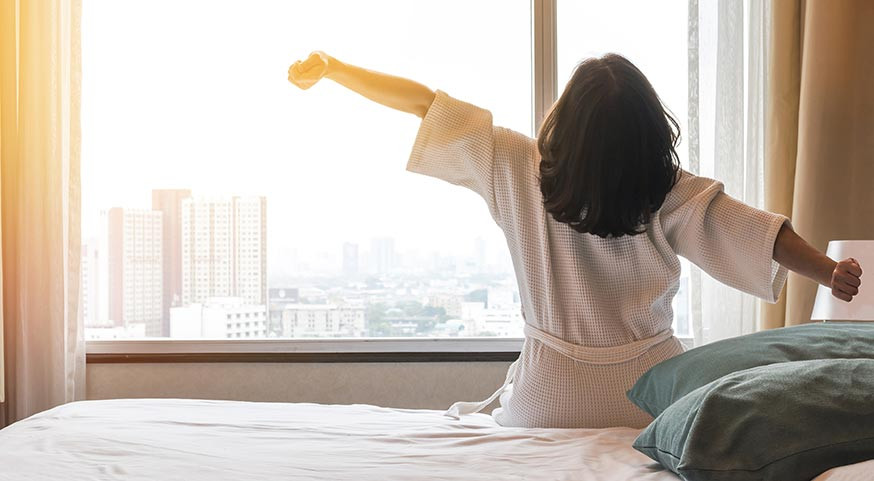Posted by Aline Martin O'Brien on 14th Sep 2020
Rise and Shine! (How to Avoid Grumpy Mornings)
Are you a morning person? Or do you get up on the wrong side of the bed?
Lying and day-dreaming in bed, enjoying soft and comfortable bedding, hugging under the comforter, stretching leisurely on your pillow -- these may soon become fond memories. Back to school is here, either remotely or on campus, and that means those late-sleeping mornings are over, at least for a while. It might also mean that the “grumpy morning person” may make a return. Is that a real thing?
Does morning mood exist?
According to a survey by a Belgian coffee company, one in six adults gets up in a bad mood each morning. Why do we get up on the wrong side of the bed so often, even when everything seems to be going well?
Myriam Kerkhofs, a sleep expert, confirms that waking up in a bad mood is not a myth, and has been widely observed: “Morning moodiness is characterized by a negative state of mind as well as limited physical and communicational activity. There is often talk of a low tolerance threshold and the person concerned wants to stay in his bubble. Fortunately for her and those around her, the symptoms disappear on average two hours after waking up."
This is how grumpy people describe their morning persona: "I don't speak," "I am on autopilot," "You must not speak to me for an hour," "I am not very talkative with the people around me," “Light and/or noise bothers me."
Causes of morning mood
Of course, you are more likely to have a bad temper in the morning if you have had poor sleep. Getting more and/or better sleep during the night lets you wake up in a better mood. Indeed, according to the World Economic Forum and the World Sleep Society, “using comfortable and inviting bedding” is one of the top ten tips for better sleep. In this spirit, we invite you to enhance your nighttime experience, starting with upgrading your bedding.
Hormonal activity. This is often the case with women during the premenstrual/menopause phase, and with men and women in cancer therapy.
Sleep inertia. Some people just need more time to wake up. In 60% of people with a morning mood, all parts of the brain do not wake up at the same time, so performance, mood, memory and alertness are not yet at their peak in the morning. Sleep inertia can last from a few minutes to several hours.
A person’s “chronotype,” or natural circadian rhythm. Some people are more evening-oriented and others more towards the morning. 70% of morning grumps said they are more “night people” than day people. Good news for them: we become more and more “morning people” with age!
How can you fight against morning mood?
“Early to bed and early to rise makes a man healthy, wealthy, and wise,” advised Benjamin Franklin. Morning mood people trying to put that advice into action today often compensate as follows: "I drink coffee," "I hit the 'snooze' button," "I have my breakfast," "I light up the room," "I listen to music."
But the answer most readily at hand is to simply get a better night’s sleep. Choose pillows suited to your sleeping position, make your bed comfortable with a mattress pad and select an oversized comforter that will minimize duvet battles with your partner. Add a down blanket or cooling sheets for a luxurious touch that will enhance your sleep. Cooling bedding technology has come a long way in recent years, and is a great way to reduce the temperature in your sleep environment, which in turn facilitates better sleep.
If, despite luxurious hotel bedding, you cannot regain your quality of sleep, and you are tired of counting sheep, you can try these little tricks to sleep better.
Additional tips to improve your mornings:
- Create a sleep routine. Regular hours, small sleep rituals, avoiding alcohol and caffeine in the evening... all of these actions can help improve your sleep - and your mood in the morning.
- The sleep expert advises: "Better to get out of bed as soon as possible and stimulate your senses." Use your nose: it is the shortest route to the brain and the smells associated with the morning activate the arousal system. The smell of coffee, toast, a frying egg, etc. stimulates you more than you might imagine.
- Make your mornings as pleasant as possible by pampering your senses. Let sunlight and fresh air enter your bedroom; use products that smell fresh and pleasant. All of these impressions tell your brain that a new day is beginning.
- Morning mood people are usually not very communicative or active. It can help to have a conversation, jump, dance, walk, or ride a bike as soon as you get up. This will help your brain wake up faster.
If you would like any help or professional advice before ordering your pillows, you may contact our customer service representatives by phone or email, and they will assist you in your decision-making.
More sources: Five Simple Tips for Better Sleep in Stressful Times

